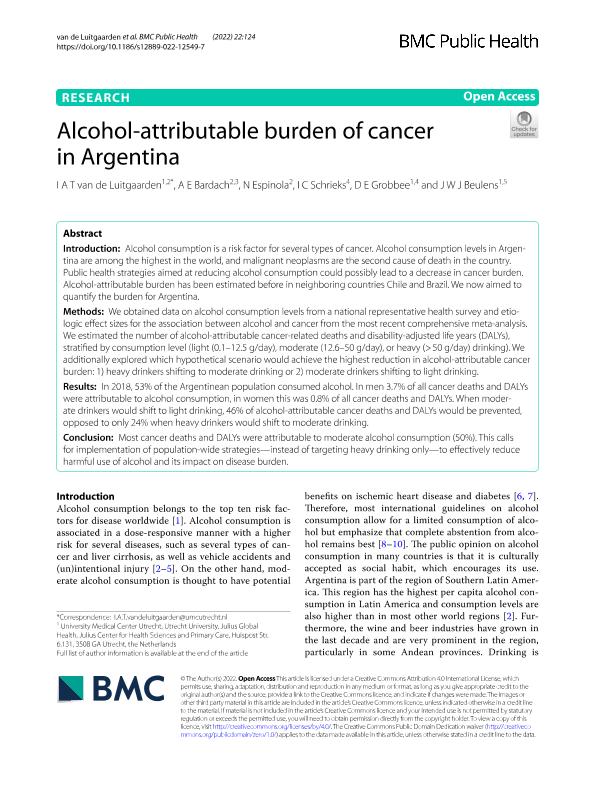Mostrar el registro sencillo del ítem
dc.contributor.author
Van de Luitgaarden, I. A. T.
dc.contributor.author
Bardach, Ariel Esteban

dc.contributor.author
Espinola, N.
dc.contributor.author
Schrieks, I.C.
dc.contributor.author
Grobbee, D. E.
dc.contributor.author
Beulens, J. W. J.
dc.date.available
2023-11-03T11:00:04Z
dc.date.issued
2022-12
dc.identifier.citation
Van de Luitgaarden, I. A. T.; Bardach, Ariel Esteban; Espinola, N.; Schrieks, I.C.; Grobbee, D. E.; et al.; Alcohol-attributable burden of cancer in Argentina; BioMed Central; BMC Public Health; 22; 1; 12-2022; 1-9
dc.identifier.issn
1471-2458
dc.identifier.uri
http://hdl.handle.net/11336/216901
dc.description.abstract
Introduction: Alcohol consumption is a risk factor for several types of cancer. Alcohol consumption levels in Argentina are among the highest in the world, and malignant neoplasms are the second cause of death in the country. Public health strategies aimed at reducing alcohol consumption could possibly lead to a decrease in cancer burden. Alcohol-attributable burden has been estimated before in neighboring countries Chile and Brazil. We now aimed to quantify the burden for Argentina. Methods: We obtained data on alcohol consumption levels from a national representative health survey and etiologic effect sizes for the association between alcohol and cancer from the most recent comprehensive meta-analysis. We estimated the number of alcohol-attributable cancer-related deaths and disability-adjusted life years (DALYs), stratified by consumption level (light (0.1–12.5 g/day), moderate (12.6–50 g/day), or heavy (> 50 g/day) drinking). We additionally explored which hypothetical scenario would achieve the highest reduction in alcohol-attributable cancer burden: 1) heavy drinkers shifting to moderate drinking or 2) moderate drinkers shifting to light drinking. Results: In 2018, 53% of the Argentinean population consumed alcohol. In men 3.7% of all cancer deaths and DALYs were attributable to alcohol consumption, in women this was 0.8% of all cancer deaths and DALYs. When moderate drinkers would shift to light drinking, 46% of alcohol-attributable cancer deaths and DALYs would be prevented, opposed to only 24% when heavy drinkers would shift to moderate drinking. Conclusion: Most cancer deaths and DALYs were attributable to moderate alcohol consumption (50%). This calls for implementation of population-wide strategies—instead of targeting heavy drinking only—to effectively reduce harmful use of alcohol and its impact on disease burden.
dc.format
application/pdf
dc.language.iso
eng
dc.publisher
BioMed Central

dc.rights
info:eu-repo/semantics/openAccess
dc.rights.uri
https://creativecommons.org/licenses/by/2.5/ar/
dc.subject
Alcohol
dc.subject
Cáncer
dc.subject
Argentina
dc.subject.classification
Epidemiología

dc.subject.classification
Ciencias de la Salud

dc.subject.classification
CIENCIAS MÉDICAS Y DE LA SALUD

dc.title
Alcohol-attributable burden of cancer in Argentina
dc.type
info:eu-repo/semantics/article
dc.type
info:ar-repo/semantics/artículo
dc.type
info:eu-repo/semantics/publishedVersion
dc.date.updated
2023-11-02T14:35:52Z
dc.journal.volume
22
dc.journal.number
1
dc.journal.pagination
1-9
dc.journal.pais
Reino Unido

dc.journal.ciudad
Londres
dc.description.fil
Fil: Van de Luitgaarden, I. A. T.. Utrecht University; Países Bajos
dc.description.fil
Fil: Bardach, Ariel Esteban. Consejo Nacional de Investigaciones Científicas y Técnicas. Oficina de Coordinación Administrativa Parque Centenario. Centro de Investigaciones en Epidemiología y Salud Pública. Instituto de Efectividad Clínica y Sanitaria. Centro de Investigaciones en Epidemiología y Salud Pública; Argentina
dc.description.fil
Fil: Espinola, N.. Instituto de Efectividad Clínica y Sanitaria; Argentina
dc.description.fil
Fil: Schrieks, I.C.. No especifíca;
dc.description.fil
Fil: Grobbee, D. E.. Utrecht University; Países Bajos
dc.description.fil
Fil: Beulens, J. W. J.. Utrecht University; Países Bajos
dc.journal.title
BMC Public Health

dc.relation.alternativeid
info:eu-repo/semantics/altIdentifier/doi/http://dx.doi.org/10.1186/s12889-022-12549-7
Archivos asociados
